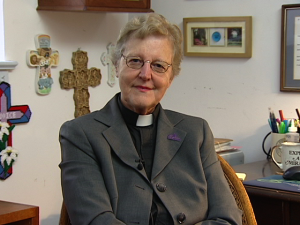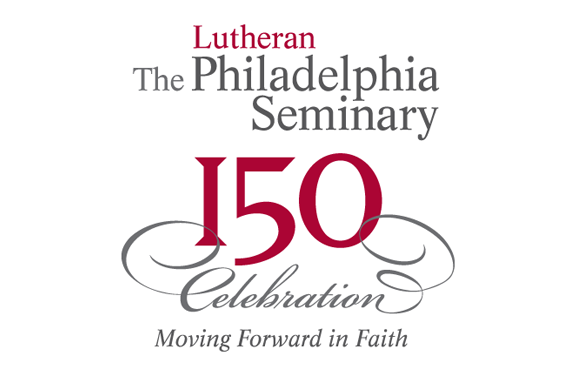
The Rev. Martha Kriebel
In 1965, the Rev. Martha Bean Kriebel became the first woman to earn a degree from The Lutheran Theological Seminary at Philadelphia (LTSP) — a Master of Sacred Theology. She had been ordained a United Church of Christ (UCC) pastor in 1959, and at the time was serving a Schwenkfelder congregation in Palm, Montgomery County, Pennsylvania, thanks to an agreement involving the UCC Synod and special vote of the congregation in the farming locale. (at right, Pr. Kriebel in her office in Collegeville)
Male pastoral colleagues in the region, hearing of her interest in furthering her education, invited her to join some of them in studying at LTSP. An alumna of Lancaster Theological Seminary, where she had earned her Bachelor of Divinity, the idea appealed to her. “I could get to the seminary in about an hour,” she recalled. “It was closer than driving to Lancaster.” She recalled attending classes at LTSP on Thursdays for three years to earn her degree, driving onto the campus, attending classes in a large room in a Gowen Avenue building that today houses apartments, and then engaging in thoughtful and memorable lunchtime conversations with faculty, staff, and other students in the 1792 Refectory. “The coffee was exceptional,” she remembered. Sometimes she was the only woman in a class of 90 men, though deaconesses and a few other women were taking classes at the school, she recalled. When she received her degree during the 1965 commencement, it was about six years before the first Lutheran woman, the Rev. Elizabeth Platz, a Gettysburg Seminary graduate, would be ordained.
“I never really thought much about the uniqueness of being a woman degree candidate on the campus,” she recalled. “I was really focused on advancing my background and being in a great place for that to happen.” Fascinated by a growing understanding of liturgy, she remembered the joy of learning from faculty members George Seltzer (Liturgy), Theodore Tappert (History of Christianity), and John Doberstein (Practical Theology). “I have worn out my copy of Professor Doberstein’s Minister’s Prayer Book, an order of prayers and devotions designed to deepen a pastor’s daily devotional life,” she said. “I still use it every day.” She also fondly remembers the New Testament lectures of the Rev. Dr. John H.P. Reumann.
Following 13 years as pastor for the Palm congregation, Kriebel was called in the early 1970s to seven years of service as assistant to the Conference Minister of her denomination in her region, with a portfolio that included evangelism, mission, and social justice. In 1979, yearning for a return to parish ministry, she was called as pastor of Trinity Reformed UCC in Collegeville, Pennsylvania, across the street from her alma mater, Ursinus College. A vigorous 78, Kriebel still serves as the congregation’s pastor, and is proud of the Trinity’s social and community service outreach.
Martha Kriebel has always lived in the region. “I grew up in a Christian family,” she said. Her father worked 48 years in finance for the Reading Railroad at 12th and Market Streets in Philadelphia. She spent a good part of her young life in the city’s East Falls section, and graduated from the city’s Girls High School. She also lived in Skippack and Lansdale, Montgomery County, and her family once operated a general store in Creamery, near Skippack.
During her college years, she studied pre-med for a while, thinking she wanted to become a medical missionary, but entering her junior year at Ursinus she began to feel a tugging to attend seminary, and decided on enrolling for postgraduate studies at Lancaster Seminary rather than medical school. She met her husband, Howard, at seminary.
Throughout her career, Kriebel has maintained close ties to LTSP, serving at one time on the advisory committee of the Academy of Preachers, which sponsored the annual Preaching Days at the school for many years, and recently serving on the planning group for the celebration of the 300th anniversary of Lutheran patriarch Henry Melchior Muhlenberg’s birth. She and her husband are stalwart donors to the seminary as members of the Theodore Tappert Society. (Howard taught for many years in the Upper Perkiomen and Southern Lehigh School Districts.)
“We have always felt a sense of openness and respect from LTSP, and have come to feel very at home on the campus,” Kriebel said. “So many people I have come to know have enjoyed the quality of academic life offered by LTSP, the sense of nurture and worship opportunities on the campus. I’ve enjoyed renewing contacts with faculty and staff over the years since I graduated.
“I’m fortunate to have been putting money into an annuity through the church since the age of 24,” she said. “And because of that we have had the chance to start a personal benevolence fund to give to the institutions that first gave something to us. I’m really grateful for what LTSP provided me. It was such a rich academic gift, and so Howard and I want to return a little bit to the school and help it remain viable into the future so others may benefit from what I received.”
Kriebel expressed appreciation for how the seminary has embraced the black church through the more than 30-year old Urban Theological Institute. “In my view the black church internalizes the Gospel and preaching in a holistic way that meets the direct needs of people inspirationally,” she said.
The seminary’s embracing of diversity for so many years, she added, “has enabled it to become a center — one place where clergy and laity from so many churches are able to come together.” She hopes LTSP, Gettysburg, and Lancaster seminaries can expand their collaborative conversations in future years to form a stronger learning consortium. “Each institution needs to hold onto its roots,” she said. “But such a collaboration will enable us to venture into the world community with greater strength. These days no one has enough resources to do what they want to accomplish alone.”
Comment from the Rev. Patricia Stauffer Medley, DMin, Freehold, NJ | November 15, 2013
I doubt that Pastor Kriebel remembers, but in 1970 when Lutherans opened ordination to women, I had just finished my sophomore year at Muhlenberg College and was not getting a lot of encouragement from friends, professors or the chaplain, as I tried to imagine what being an ordained woman would be like. My Mennonite grandmother, Margaret Stauffer, God rest her, who lived in nearby Boyertown, knew about Pastor Kriebel and arranged for a lady friend who still drove to take us to Palm to go and meet her, so that I had the opportunity for a role model. I remember asking, “What do you wear?” because there was no market yet for women’s clergy shirts. We talked about marriage, acceptance issues and I gained courage to register as a pre-theological student. It was a very important visit for me and I’ve always been grateful for my grandmother’s foresight and caring and Martha’s kind mentoring that afternoon. Dr. John Newpher was President of LTSP and invited me to stay at his home for a prospective students weekend, saying that there were no accommodations for females on campus. I declined and said I would be interested if women could live on campus. After attending Princeton, which had many Lutheran faculty members, and becoming an alumna of LTSP through the supervision of my internship, in 1976, I was the first woman ordained by the Northeastern Pennsylvania Synod of the LCA. I’m delighted to hear that Martha is still active in ministry! God bless those pioneers. The Rev. Patricia Stauffer Medley, D. Min., Freehold, NJ
first published in PS Portions

wayne A gruver
March 9, 2020 3:32 pmIm a member of FALKNER SWAMP UCC–im a historian,consistory member and on the anniversary committee–we would like to send you an invitation to our 300th celebration on sat. oct.17,2020 and the service on oct.18,2020–is there a adress we can send an invite to you–thanks — wayne gruver